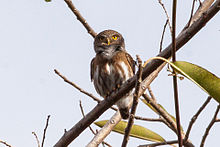| Colima pygmy owl | |
|---|---|

| |
| Conservation status | |
 Least Concern (IUCN 3.1) | |
| CITES Appendix II (CITES) | |
| Scientific classification | |
| Domain: | Eukaryota |
| Kingdom: | Animalia |
| Phylum: | Chordata |
| Class: | Aves |
| Order: | Strigiformes |
| Family: | Strigidae |
| Genus: | Glaucidium |
| Species: | G. palmarum |
| Binomial name | |
| Glaucidium palmarum Nelson, 1901 | |

| |
| Distribution of Colima pygmy owl Resident | |
The Colima pygmy owl (Glaucidium palmarum) is a species of owl in the family Strigidae. It is endemic to the western part of Mexico.
Taxonomy and systematics
The International Ornithological Committee (IOC) treats the Colima pygmy owl as monotypic. However, the Clements taxonomy and Handbook of the Birds of the World recognize three subspecies, the nominate Glaucidium palmarum palmarum, G. p. oberholseri, and G. p. griscomi.
Description
The Colima pygmy owl is 13 to 15 cm (5.1 to 5.9 in) long. Male specimens weigh 43 to 48 g (1.5 to 1.7 oz) and females are noted as heavier without quantification. The head and back are brown, the wings mostly grayish brown, and the tail a deeper grayish brown. The head has small dull white spots. White spots show along the closed wing and the tail has oval white spots forming bands across it. The face has dull white "eyebrows" and the nape has a pair of dark "eye spots". The underparts are buffy white with wide cinnamon stripes.
Distribution and habitat
The Colima pygmy owl is found in western Mexico from central Sonora south to Oaxaca, ranging from sea level up to 1,500 m (4,900 ft) in elevation. It inhabits several types of landscapes including thorn, tropical deciduous, lowland tropical evergreen, and the lower parts of humid montane forests. It is also found in coffee plantations.
Behavior
Feeding
The Colima pygmy owl is primarily nocturnal though it is also active in daytime. It forages in the mid levels of the forest. Little is known about its diet, which is presumed to be large arthropods and small vertebrates.
Breeding
The Colima pygmy owl's breeding phenology is essentially unknown. It is thought to be socially monogamous and is presumed to nest in tree cavities.
Vocalization
|
Songs and calls Listen to Colima pygmy owl on xeno-canto |
The Colima pygmy owl's song is a "hollow hooting ... with variable, often increasing, number of notes... up to 24 notes (or more?) in series."
Status
The IUCN has assessed the Colima pygmy owl as being of Least Concern. Though its population has not been enumerated, the species has been described as fairly common to very common throughout its large range and the population appears to be stable.
References
- ^ BirdLife International (2016). "Colima Pygmy-owl Glaucidium palmarum". IUCN Red List of Threatened Species. 2016. Retrieved 6 September 2021.
- "Appendices | CITES". cites.org. Retrieved 2022-01-14.
- ^ Gill, F.; Donsker, D.; Rasmussen, P. (July 2021). "IOC World Bird List (v 11.2)". Retrieved July 14, 2021.
- Clements, J. F., T. S. Schulenberg, M. J. Iliff, S. M. Billerman, T. A. Fredericks, J. A. Gerbracht, D. Lepage, B. L. Sullivan, and C. L. Wood. 2021. The eBird/Clements checklist of Birds of the World: v2021. Downloaded from https://www.birds.cornell.edu/clementschecklist/download/ Retrieved August 25, 2021
- HBW and BirdLife International (2020) Handbook of the Birds of the World and BirdLife International digital checklist of the birds of the world Version 5. Available at: http://datazone.birdlife.org/userfiles/file/Species/Taxonomy/HBW-BirdLife_Checklist_v5_Dec20.zip retrieved May 27, 2021
- ^ Schulenberg, T. S. (2020). Colima Pygmy-Owl (Glaucidium palmarum), version 1.0. In Birds of the World (T. S. Schulenberg, Editor). Cornell Lab of Ornithology, Ithaca, NY, USA. https://doi.org/10.2173/bow.copowl1.01 retrieved September 6, 2021
